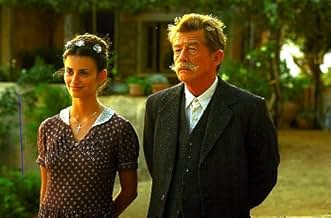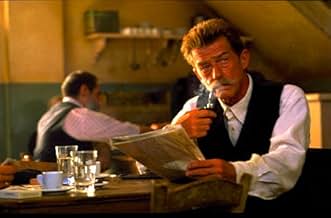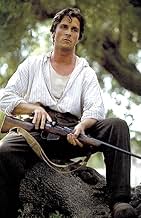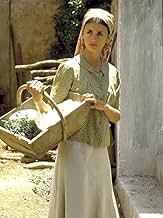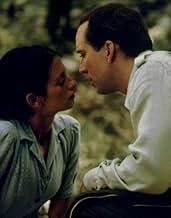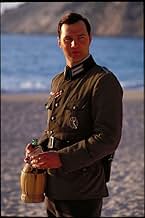जब एक मछुआरा, द्वितीय विश्व युद्ध के दौरान ग्रीक सेना की ओर से लड़ने के लिए निकलता है, तो उसकी मंगेतर को एक स्थानीय इतालवी कमांडर से प्यार हो जाता है.जब एक मछुआरा, द्वितीय विश्व युद्ध के दौरान ग्रीक सेना की ओर से लड़ने के लिए निकलता है, तो उसकी मंगेतर को एक स्थानीय इतालवी कमांडर से प्यार हो जाता है.जब एक मछुआरा, द्वितीय विश्व युद्ध के दौरान ग्रीक सेना की ओर से लड़ने के लिए निकलता है, तो उसकी मंगेतर को एक स्थानीय इतालवी कमांडर से प्यार हो जाता है.
- पुरस्कार
- 2 जीत और कुल 6 नामांकन
- Father Aresenios
- (as Dimitris Kamperidis)
- Velisarios, The Strongman
- (as Pedro Sarubbi)
- Dimitris
- (as Aimilios Heilakis)
- Mayor
- (as George Kotanidis)
फ़ीचर्ड समीक्षाएं
The love triangle is an interesting one and strikes me as believable, because I know it happened in various places under occupation. Penelope Cruz played Pelagia, a young Greek girl engaged to be married to Mandras (Christian Bale). I had questions about the depth of their love from the start, but their future was torn apart when Italy invaded Greece, and Mandras went off to fight. After German intervention, Greece is conquered and the island Pelagia lives on comes under Italian occupation, during which Pelagia meets and begins to fall in love with Captain Corelli (Nicholas Cage.) This, of course, was a dilemma that came to many young women in occupied lands. As they got to know their occupiers, they started to see them not as the enemy but as real people, and sometimes fell in love - often to the disapproval of their neighbours. I just finished reading an interesting book about the German occupation of Britain's Channel Islands in which this was a major issue. Once Mandras returns to the island, Pelagia is torn between them.
The second background issue is the Italian occupation itself, which I thought was quite realistically portrayed. First was the contempt with which the island treated their Italian occupiers. Greece defeated Italy (quite true from a historical perspective) and was really conquered by the Germans. The refusal of the town to surrender to the Italians and instead to insist on surrendering to a German officer struck me as something that could well have happened (and was quite funny in fact. I loved the line, "we would rather surrender to this German's dog than to you Italians.") The portrayal of the Italian troops also struck me as believable. The Italian Army was never enamoured of their German ally, and never enthusiastic about fighting with them. Although Hitler and Mussolini were close friends, their soldiers tended to treat each other with contempt. Here, the Italians are more interested in singing than fighting (which the German troops on the island simply can't understand,) and are ecstatic when Italy makes peace and withdraws from the war - until they discover that this may well make them prisoners of the Germans. It was all quite well done, I thought.
It falters a bit at the end with an all too predictable finish, but still deserves praise.
7/10
There is much about this film that is wonderful and fantastic. The cinematography by John Toll (Cinematographer for Braveheart and Legends of the Fall, winning Oscars for both) is splendid. Working with Madden, the choices for locations on the Greek island of Kefallonia are superb and the visual images that come from photographing these majestic locations in varying light are lush and beautiful. Madden also uses numerous Greek actors as the townspeople, giving the town an authentic feel. The soundtrack is also terrific and the mandolin passages and vocals by the Italian soldiers are marvelous.
Madden does an excellent job of bringing us the Italian occupation and the romance, which take up the greater part of the film. There are numerous sweet and funny moments throughout this segment. However, by the time the serious battle drama is ready to unfold, there isn't much film left in the reel and this component is extremely rushed and abbreviated. While the battle scenes are well done, subsequent to the battle it is obvious that increasingly greater compromises are being made to keep the film from running too long. By the time we reach the post war scenes, the treatment is merely skeletal. Another negative is that the DVD is particularly sparse on features.
Nicholas Cage is charming in the romantic lead as the sentimental Captain who seems to have joined the army to sing rather than fight. When fight he must, Cage switches gears seamlessly into a man of fierce principle and resolve and somehow remains believable in both personas.
Penelope Cruz, whom the camera loves, gives an uninspired performance as Pelagia. In part this is because Cage so dominates the screen, but Cruz just seems too placid in a part that should be emotionally torrential and dynamic. She allows the character to be objectified as Corelli's love interest rather than establishing her as a powerful character in her own right.
John Hurt gives a fantastic performance as the wise old doctor, who knows as much about human nature as medicine. However, Christian Bale seems a bit overwrought and stiff as Pelagia's fiancé.
I rated this film an 8/10. Despite some drawbacks, this is a touching film that is well worth seeing. The photography alone is worth the price of admission.
All the way through I found myself convincing myself that the movie was unsuccessful, and had stripped the book's plot back so far as to render it redundant. The ending, however, is much better than that in the novel, and I could not stop thinking about the movie afterwards. Still, the plusses (John Toll's magnificent cinematography, Stephen Warbeck's great score, etc) I felt did not outweigh my initial negatives (Cage's miscasting, a heavily diluted script).
But, two days later, I was queuing again to see Corelli, and although not perfect, I have to admit now that the movie is the best anyone could have expected. Cage is actually brilliant in a role that even de Berniere was concerned was not a fully rounded character: his carefree spirit which gives way to shattered remorse is spot on, and complements the superb double act of Penelope Cruz and John Hurt perfectly. David Morrissey is quietly effective as Weber, the Nazi officer trying to reconcile his feelings for his newfound Italian friends and his inbred superiority complex to those around him. And the fine Greco-Italian supporting cast bring de Berniere's sundrenched world of Cepholonia dazzlingly alive.
On leaving the cinema second time around, I finally let go my passion for the novel which prevented me from fully appreciating the story of WW2 Cepholonia in cinematic terms. My hat goes off to John Madden who, despite the almost expected critical drubbing he is receiving from the British critics (any director who has had a major success like Shakespeare in Love behind them is always a target for these moaning ninnies!),has managed to transfer a terrifically difficult book to the big screen with such heart, verve and humanity (the core virtues of the novel, in fact) that he has created another classic love story that will probably only be fully appreciated when the dust has settled a few years from now.
If you are a fan of the book, like me, it's hard, but try not to make the same mistake on your initial viewing. Try to erase the book from your mind for two hours, bathe yourself in the glorious Mediterranean atmosphere, and discover Corelli, Pelagia, Mandras, Dr Iannis, as if for the first time (pretend you're watching something made from an original screenplay), and I guarantee you won't be disappointed.
In fact, you'll be eagerly waiting to own your own copy of this delightful movie on video or DVD.
8/10
क्या आपको पता है
- ट्रिवियाWriter Louis de Bernières re-wrote the book approximately thirty-five times, to ensure he had gotten details told to him by locals as accurate as possible.
- गूफ़The movie implies that the earthquake that devastated Cephallonia after World War II occurred in 1947. It was actually in 1953. At the end of the credits, the movie is dedicated to the memory of those who died in the post-war earthquake of 1953. The DVD commentary also mentions the correct date.
- भाव
Iannis: When you fall in love, it is a temporary madness. It erupts like an earthquake, and then it subsides. And when it subsides, you have to make a decision. You have to work out whether your roots are become so entwined together that it is inconceivable that you should ever part. Because this is what love is. Love is not breathlessness, it is not excitement, it is not the desire to mate every second of the day. It is not lying awake at night imagining that he is kissing every part of your body. No... don't blush. I am telling you some truths. For that is just being in love; which any of us can convince ourselves we are. Love itself is what is left over, when being in love has burned away. Doesn't sound very exciting, does it? But it is!
- साउंडट्रैकRicordo Ancor
(Pelagia's Song)
Written by Stephen Warbeck and Paco Reconti (as Reconti)
Performed by Russell Watson
Courtesy of Decca Music Group
टॉप पसंद
- How long is Captain Corelli's Mandolin?Alexa द्वारा संचालित
विवरण
- रिलीज़ की तारीख़
- कंट्री ऑफ़ ओरिजिन
- आधिकारिक साइटें
- भाषाएं
- इस रूप में भी जाना जाता है
- Cây đàn Mandolin của Đại úy Corelli
- फ़िल्माने की जगहें
- Chorgota Beach, Komitata Village, Kefallonia Island, यूनान(exterior scenes)
- उत्पादन कंपनियां
- IMDbPro पर और कंपनी क्रेडिट देखें
बॉक्स ऑफ़िस
- बजट
- $5,70,00,000(अनुमानित)
- US और कनाडा में सकल
- $2,55,43,895
- US और कनाडा में पहले सप्ताह में कुल कमाई
- $72,09,345
- 19 अग॰ 2001
- दुनिया भर में सकल
- $6,21,12,895
- चलने की अवधि2 घंटे 11 मिनट
- रंग
- ध्वनि मिश्रण
- पक्ष अनुपात
- 2.39 : 1
इस पेज में योगदान दें



